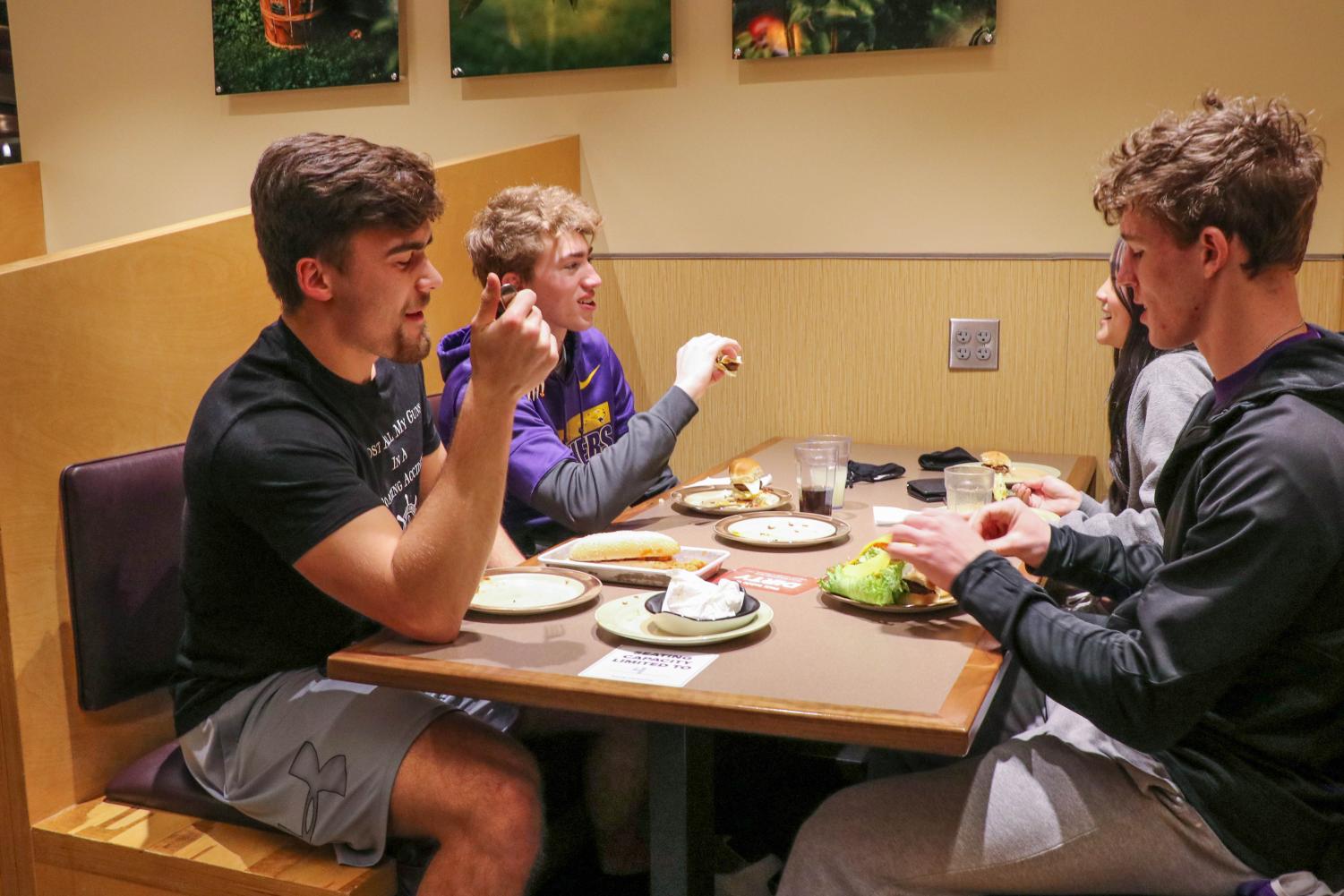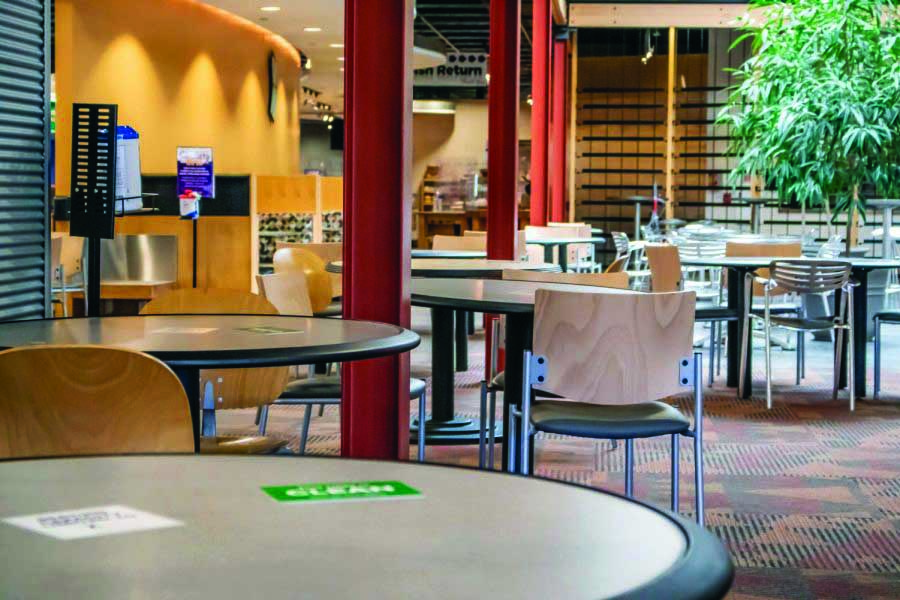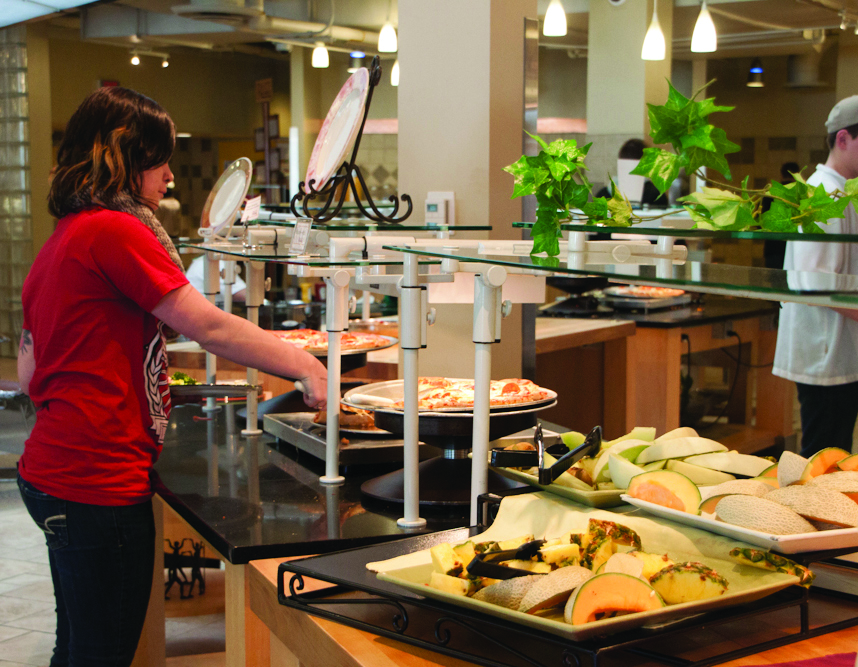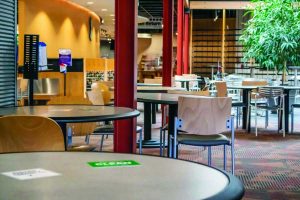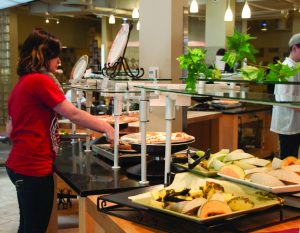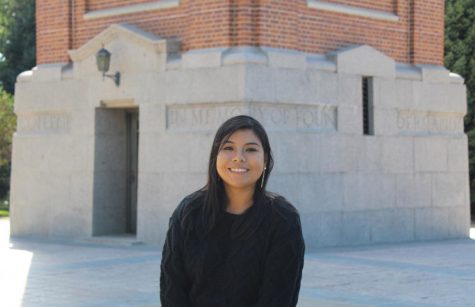Behind the empty lunch counter
Jan 24, 2022
UNI’s dining centers continue to struggle with staffing shortages
In Piazza and Rialto, lunch counters sit empty and abandoned with “Help Wanted” signs dotting the dining room. Menu options have been reduced, late night hours have shifted to “dine-out only” and Styrofoam plates (to avoid the work of dishwashing) fill their garbage bins – all this in an effort to combat the severe labor shortage hitting the dining centers. “Last year to this year has increased the workload by quite a lot. We’re constantly moving and being rearranged,” said Emma Marshall, a student worker in Piazza.
The labor shortage at UNI is not a unique problem. If you did a quick search on the worker shortage in university dining centers, you would find your browser flooded with stories from campuses all over the country. At the University of Iowa, the dining operation has fallen to only 42% of its needed student staff of 1,400 workers, according to a report by the Cedar Rapids Gazette. Long lines and extended waits are the norm at Simpson College as it experiences record lows in student workers, and Michigan State has had to close off its residential dining centers to the public. From 2019 to today, there are 210 less employees working in the dining locations on UNI’s campus according to Matthew Copp, manager of Piazza.
Although the prominence of the worker shortage on campus is undeniable, the exact cause can only be speculated. A common assumption is that the worker shortage is a consequence of the global pandemic.
“I’ve heard a lot of people say that working in the dining center used to be something everybody wanted to do, like that was the thing to do. But I actually feel like the increase of technology and isolation because of COVID has driven people away from wanting to do social projects, and if they don’t have to work, they won’t,” said Jaydon VandeNoord, a student employee in Piazza.
Aside from COVID-19, a factor that could be contributing to the worker shortage is the not-so-glamorous reputation of the food service industry.
Heidi Boettcher, a former Rialto employee who spent all her shifts working in the dish room does not recall that time fondly. After three months of working, she lost hope that she would ever be moved out of the dish room and quit her job out of frustration. When people ask her if they should work in the dining center, she tells them it’s not worth their time.
“I guess if you know a lot of upperclassmen and they tell you about the dining center a lot of people end up not wanting to work there at all because of the experiences other people have had,” Boettcher said.
Another student employee, who wished to remain anonymous, agreed that reputation is a contributing factor to the worker shortage and makes a case for why the treatment of workers in the dining centers goes hand-in-hand with this issue. After working at Piazza for two semesters, she began to see a theme of what she called “exploitation.” She described this as an uneven distribution of work hours between students and recalled how the same student workers, specifically the student managers, were constantly expected to pick up extra shifts.
“It seems like a lot of issues that came about were over the summer. I think a lot of people quit during that time period and they entered the semester with a major, major, major shortage in workers. People were sick of the way they were being treated and they had to set their own boundaries and put themselves first.”
VandeNoord also spoke on this theme of uneven work distribution among some of the staff. After five semesters in Piazza, he has started to gain recognition from the full-time staff and works more now than when he first started the job.
“Usually, they just keep expecting you to do more if you’re doing a good job because they know you’re capable of it.”
Working in the dining centers often requires employees to stand for hours, serving students from behind a glass window in a noisy dining hall and is often seen as a physically taxing job. With the wide variety of on-campus jobs available, working in the dining centers may not be the most appealing option for students, even with the increased wages.
“There’s just a lot of other jobs, like all over campus. And, I think, other ones that sound more enticing,” said Marshall.
While the worker shortage has altered the dining experience of many students and student workers, it has potentially had the greatest impact on the full-time dining staff. The environment in the dining centers was labeled as “busy, hectic, and stressful” by full time staff member Nancy Klodt, who also commented, “People are very cautious, not knowing if others have been vaccinated or may be sick.”
Another full-time staff member, Joe Silva stated, “We hold ourselves to expectations of high quality… that hasn’t changed, but the number of people to do it has changed.”
To combat this issue, the dining centers have added an incentive for potential student-workers, raising starting wages by $2. According to Copp, this has helped to increase staffing levels by 50% from what they were in August. Unfortunately, the effort to incentivize workers has been concentrated on students, excluding full-time staff members.
“Those here haven’t received anything for working through it,” remarked Klodt.
With less hands to do the same amount of work, the past year has undoubtedly been a struggle for dining center employees. Despite the circumstances, there are benefits of working in the dining center that can be recognized. In a busy and stressful work environment, employees still find enjoyment in their jobs.
“I enjoy working there because of the people I work with, and I’ve had good luck with that,” Marshall said.
Another student worker who commented on the environment in the dining halls said, “The culture implemented by the other student employees was great. I loved my coworkers and I’m still friends with them.”
Although the situation seems bleak, the dining staff looks to the future with a positive attitude and continues to find new ways to recruit students. Carol Fletcher, the director of dining services, is proud of her staff for their ability to adjust and adapt to the ongoing changes.
“They continue to focus on students and how to best serve them both from a dining perspective as well as an employer standpoint,” Fletcher said.

